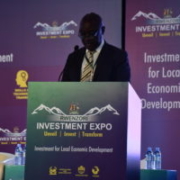Government to scaleup fish farming, says Adoa – Fisheries Minister
GULU – The Ugandan government is on a mission to take fish farming to every part of the country including parts without water bodies, the State Minister for Fisheries, Hellen Adoa has said.
Adoa who doubles as the Woman Member of Parliament for Serere district said that, “We want to decongest our lakes. We want to show the world that even without a lake, swamp, or river, we can farm fish.”
The Minister was speaking on Monday during the belated National World Fisheries Day celebrations held at Negri College in Gulu City.
“With aquaculture, even without a farm, you can fish farm. Find time and visit Hon Jeje Odongo. He has built tanks in front of his house and he is doing very well with catfish. Catfish is highly wanted in Democratic Republic of Congo and other places around the world.
Odongo is the current Internal Affairs Minister and also Member Parliament for Orungo County.
Adoa welcomed a suggestion by the Assistant Commissioner of private schools and institutions in the Ministry of Education, Mutee Kanga George, for agriculture especially aquaculture to be made compulsory at all levels of education in the country.
“Currently agriculture is compulsory in senior one and senior two but we should make it compulsory at all levels of education and then let each sub-region pick on the one or two sub-sections,” Mutee said.
“I am very sure aquaculture will be one of those sub-sections that will help address the issue of unemployment in this country,” he said.
Adoa in response said, “The children will be excited to do their farming projects after class because they are practical,” she noted adding that the school fish farms can be used to feed children and their families.
The Archbishop of Gulu, Dr John Baptist Odama pledged the Catholic Church’s support to the fish farming project saying, “We are not just preaching the bible but also ready to preach agriculture and fisheries in particular.”
Meanwhile, the Minister also said that government’s target is to see that each Ugandan eats 20 kgs of fish per year by 2030 because of its high nutritional contents.
“Currently, each person in Uganda eats between 10-12 kgs of fish per year but we want this to improve by 2030 because fish is what will save us from diseases that come with eating red meat,” she noted.
A total of 115 youths from Arua and Gulu graduated with certificates in fish farming and fish value chain during the National World Fisheries Day.
The youths were trained at Isidoro farm located at Negri College including two priests and have since formed four cooperative groups through which they will coordinate their activities.
Okaka Geoffrey, Gulu Chief Administrative Officer (CAO) urged the government to support the district in making the fish fry center in Laliya-Gulu district functional.
“We have a fish fry center which is not functional. We are currently engaging development partners to get help so that our fish farmers don’t struggle to access quality fingerlings and fish feeds,” he said.
He said that 5.13 metric tons of fish were harvested in Gulu in 2020, an amount he said could increase if fish farmers are supported.
“We have been supporting farmers with fish fingerlings through the Operation Wealth Creation and the Agriculture extension grant but it is not enough,” Okaka said.
https://thecooperator.news/minister-for-agriculture-commissions-two-cassava-factories-in-nebbi/
Buy your copy of theCooperator magazine from one of our countrywide vending points or an e-copy on emag.thecooperator.news
The post Government to scaleup fish farming, says Adoa – Fisheries Minister appeared first on The Cooperator News.


